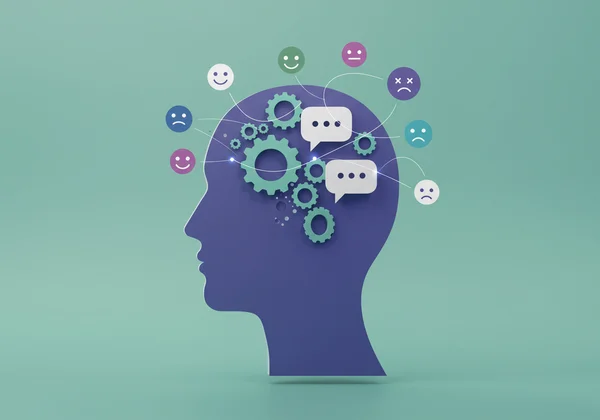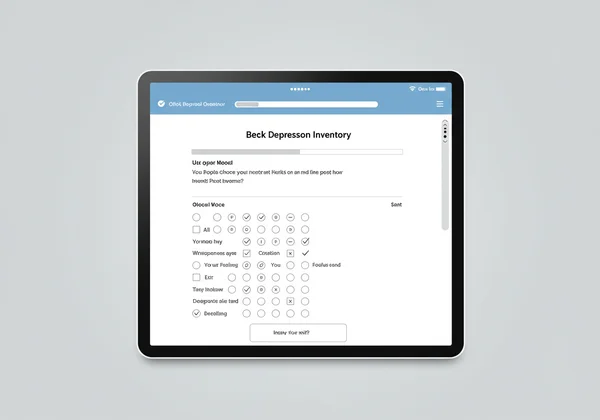BDI 테스트: 베크 우울증 지수 완벽 가이드
July 13, 2025 | By Beatrice Holloway
기분에 압도당하거나 자신의 감정을 잘 모르겠다고 느끼시나요? BDI 테스트 (베크 우울증 지수)는 과학적으로 검증된 도구로, 자신의 감정 상태에 대한 통찰력을 얻는 데 도움을 줍니다. 이 가이드에서는 BDI 테스트의 기원, 목적, 그리고 더 나은 자기 인식을 향한 여정에 어떻게 힘을 실어줄 수 있는지 에 대해 알려드리겠습니다. 감정을 탐색할 준비가 되셨다면, 지금 바로 평가 시작하기를 클릭하세요.
베크 우울증 지수(BDI) 테스트란 무엇인가요?
베크 우울증 지수는 단순한 설문지가 아니라, 개인이 현재 자신의 감정 상태를 이해하도록 돕기 위해 설계된 깊이 있는 도구입니다. 특정 기간 동안 자신의 감정과 경험의 다양한 측면을 되돌아볼 수 있는 체계적인 방법을 제공합니다.

탄생 비화: 아론 T. 벡 박사와 그의 유산
베크 우울증 지수 (BDI)는 인지행동치료(CBT)의 아버지로 널리 알려진 선구적인 정신과 의사 아론 T. 벡(Aaron T. Beck) 박사가 1961년에 개발했습니다. 벡 박사는 부정적인 사고 패턴이 우울 증상을 유지하는 데 중요한 역할을 한다는 가설을 통해 우울증에 대한 우리의 이해를 혁신적으로 바꾸어 놓았습니다. BDI에 대한 그의 연구는 주관적인 임상적 인상을 넘어선, 우울증 심각도에 대한 표준화되고 객관적인 측정 도구의 필요성에서 비롯되었습니다. 이러한 경험적 측정에 대한 그의 헌신은 정신 건강 분야에서 그의 유산을 확고히 했습니다.

BDI의 목적 및 구조 이해
본질적으로 BDI는 본인이 직접 작성하는 간단한 21개 문항의 설문지입니다. 각 문항은 슬픔, 비관주의 또는 즐거움 상실과 같은 특정 우울 증상을 묘사합니다. 응답자는 지난 2주간 (오늘 포함) 자신의 감정과 경험을 가장 잘 반영하는 문항을 선택합니다. 질문은 우울증과 관련된 정서적, 인지적, 동기적 및 신체적 측면을 다룹니다. 이러한 포괄적인 접근 방식 덕분에 우울증 BDI 테스트 는 광범위한 잠재적 증상을 포착할 수 있으며, 기분 통찰 을 위한 귀중한 초기 증상 점검표 가 됩니다.
BDI의 과학적 근거: 타당도와 신뢰도
자기 평가 도구를 탐색할 때, 과학적 근거에 대해 의문을 갖는 것은 당연합니다. 모든 심리적 도구에 있어 BDI 타당도 와 신뢰도는 무엇보다 중요합니다.
BDI 테스트는 과학적으로 타당한가요? 증거와 인정
BDI 테스트 는 전 세계적으로 가장 광범위하게 연구되고 존경받는 자가 보고식 우울 측정 도구 중 하나입니다. 수십 년간의 수많은 연구를 통해 지속적으로 높은 신뢰도와 타당도를 입증해왔습니다. 이는 테스트가 측정하고자 하는 것(우울 증상)을 일관되게 측정하며, 다양한 인구 집단과 환경에서 정확하게 측정한다는 것을 의미합니다. 정신 건강 전문가 및 연구자, 임상의들에게 폭넓게 인정받고 있다는 사실은 신뢰할 수 있는 선별 도구로서의 신뢰성을 입증합니다. BDI 테스트를 통해 여러분은 상당한 과학적 증거에 기반한 도구를 사용하게 됩니다.

BDI vs. BDI-II: 주요 차이점 및 발전 과정
시간이 지남에 따라 심리학적 이해는 발전하고 평가 도구도 개선됩니다. 최초의 BDI는 1996년에 BDI-II로 업데이트되었습니다. 이 개정은 DSM-IV (정신 질환 진단 및 통계 편람, 제4판)의 주요 우울 장애 진단 기준에 더 가깝게 맞추기 위한 것이었습니다. 두 버전 모두 매우 타당하지만, BDI-II는 최신 진단 기준에 따른 증상 반영 덕분에 오늘날 임상 및 연구 환경에서 일반적으로 선호됩니다. 신뢰할 수 있는 온라인 플랫폼 은 정확한 통찰력을 제공하기 위해 검증된 버전을 사용합니다.
누가 BDI를 사용하며 어떻게 도움이 되나요?
베크 우울증 지수 의 영향력은 자기 계발을 훨씬 넘어, 정서적 안녕을 이해하고자 하는 다양한 개인과 전문가들에게 서비스를 제공합니다.
개인적인 통찰을 위한 당신의 자기 평가 여정
많은 사람들에게 BDI는 자기 평가 를 위한 개인적이고 접근하기 쉬운 출발점입니다. 지속적인 슬픔, 피로감 또는 예전에 즐겼던 활동에 대한 흥미 상실을 경험하고 있다면, 무료 BDI 테스트 를 통해 자신의 현재 상태를 객관적으로 파악할 수 있습니다. 자신의 생각과 감정 패턴을 인식하는 데 도움을 주며, 경험하는 것을 명확하게 표현할 수 있는 구조화된 방법을 제공합니다. 이러한 초기 기분 통찰 은 자기 관리와 추가 지원을 찾는 데 강력한 계기가 될 수 있습니다. 테스트를 받는 것은 자신의 정서적 안녕 을 이해하는 데 중요한 단계가 될 수 있습니다.
임상 실무 및 학술 연구
개인적인 사용을 넘어, BDI의 임상적 활용 은 매우 광범위합니다. 심리학자 및 정신과 의사를 포함한 정신 건강 전문가는 BDI를 선별 도구로 사용하여 우울 증상의 심각도를 평가하고, 치료 진행 상황을 모니터링하며, 치료 결과를 평가합니다. 이는 심층적인 임상 면담을 보완하는 귀중한 정량적 데이터를 제공합니다. 또한, 연구자들은 학술 연구 연구에서 BDI를 자주 사용하여 참가자를 선별하고, 증상 수준을 측정하며, 우울증의 다양한 측면을 조사하여 정신 건강에 대한 집단적 지식에 크게 기여합니다.
온라인 무료 BDI 테스트: 저희 플랫폼에서 무엇을 기대할 수 있나요?
과학적 원리를 이해하는 것도 중요하지만, 직접 온라인 BDI 테스트 를 경험하는 것은 또 다른 차원입니다. 저희 플랫폼은 이 과정을 간단하고, 비밀이 보장되며, 매우 접근 가능하게 만듭니다.
BDI 결과 확인을 위한 간단한 단계
저희 플랫폼 은 사용 편의성을 고려하여 설계되었습니다. BDI 테스트 결과 를 얻으려면 플랫폼으로 이동하여 설문지를 시작하기만 하면 됩니다. 지난 한 주 동안의 기분에 대해 되돌아보는 21개의 질문을 받게 됩니다. 가장 정확한 결과를 얻으려면 가능한 한 정직하고 솔직하게 답변해 주세요. 과정은 일반적으로 5-10분 정도 소요됩니다. 완료되면 시스템은 즉시 BDI 점수를 계산하고 BDI 점수 의미 에 대한 초기 해석을 제공하여 경도, 중등도, 심각 등 BDI 점수별 다양한 증상 심각도 수준을 나타냅니다. 빠르고 사적인 방식으로 즉각적인 명확성을 얻을 수 있습니다. 사용자 친화적인 플랫폼에서 결과 확인하세요.

점수 그 이상: 초기 통찰력 및 AI 기반 옵션
점수를 받는 것은 시작에 불과합니다. 저희 서비스 는 단순한 숫자 이상의 것을 제공합니다. 즉각적인 점수와 함께 점수가 현재 감정 상태에 대해 무엇을 시사하는지에 대한 예비적인 통찰력을 제공받게 됩니다. 더 깊은 이해를 원하는 분들을 위해 플랫폼은 선택적인 AI 기반 분석 보고서를 제공합니다. 이 고급 기능은 표준 해석을 넘어 응답 패턴을 분석하여 행동 및 심리 상태에 대한 더 개인화되고 심층적인 통찰력을 제공합니다. 이러한 향상된 분석은 더 포괄적인 그림을 제공하여, 더 나은 정신 건강 지원 및 자기 관리를 위한 다음 단계를 결정하는 데 도움이 됩니다. 이 모든 과정에서 귀하의 개인 정보 보호와 기밀 유지가 최우선 과제임을 약속드립니다.
BDI 테스트를 통해 더 나은 기분 통찰을 향한 첫걸음
BDI 테스트 는 감정적 안녕에 대한 귀중한 기분 통찰 을 제공할 수 있는 강력하고 과학적으로 검증된 선별 도구입니다. 이는 자기 이해를 위한 훌륭한 출발점이 되며, 더 나아가 전문가의 지원이 유익할지 여부를 고려하는 데 도움이 됩니다. BDI는 우울 증상의 존재 및 심각도를 나타낼 수 있지만, 진단 도구는 아니며 자격을 갖춘 정신 건강 전문가의 전문적인 진단을 대신할 수는 없습니다.
더 나은 자신을 이해하기 위한 이 힘찬 단계를 밟으시기를 바랍니다. 결국, 자신의 기분에 대한 통찰력을 얻는 것은 더 풍요롭고 만족스러운 삶을 향한 강력한 발걸음입니다. 지금 바로 저희 플랫폼을 방문하여 무료 도구 체험을 통해 즉각적인 기분 통찰을 얻으세요.
베크 우울증 지수(BDI)에 대한 자주 묻는 질문
BDI 테스트는 주로 무엇에 사용되나요?
BDI 테스트 는 주로 성인과 청소년의 우울 증상 심각도를 평가하기 위한 자가 보고식 선별 도구로 사용됩니다. 개인의 현재 기분 통찰 을 얻는 데 도움을 주며, 전문가가 예비 선별 또는 치료 진행 상황을 모니터링하는 데 사용할 수 있습니다. 진단을 위한 도구는 아닙니다.
BDI 테스트는 얼마나 정확하고 타당한가요?
BDI는 자가 보고식 선별 도구의 영역 내에서 매우 정확하고 타당한 것으로 간주됩니다. 광범위하게 연구되었으며 전 세계 정신 건강 전문가 들에게 널리 인정받고 활용되고 있습니다. 과학적 타당성을 통해 우울 증상을 신뢰성 있게 측정하므로 초기 평가를 위한 신뢰할 수 있는 자료입니다.
BDI 테스트로 우울증을 진단할 수 있나요?
아니요, BDI 테스트 로는 우울증을 진단할 수 없습니다. 이는 선별 및 증상 심각도 측정 도구입니다. 우울증에 대한 공식적인 진단은 포괄적인 임상 평가 후에 심리학자나 정신과 의사와 같은 자격을 갖춘 정신 건강 전문가만이 내릴 수 있습니다. 테스트 결과는 항상 전문가와 상담하여 적절한 해석과 조언을 받는 것이 좋습니다.
BDI 테스트 결과는 어떻게 해석해야 하나요?
BDI 테스트 결과 는 일반적으로 최소, 경도, 중등도 또는 심각 증상을 나타내는 범주에 속합니다. 이러한 범주는 현재 자신의 감정 상태에 대한 전반적인 아이디어를 제공합니다. 플랫폼 은 점수와 함께 초기 해석을 제공하며, 선택적인 AI 기반 보고서는 더 깊은 분석을 제공할 수 있습니다. 그러나 완전한 이해를 위해 잠재적인 다음 단계를 논의하려면 항상 정신 건강 전문가와 상담하는 것이 좋습니다.